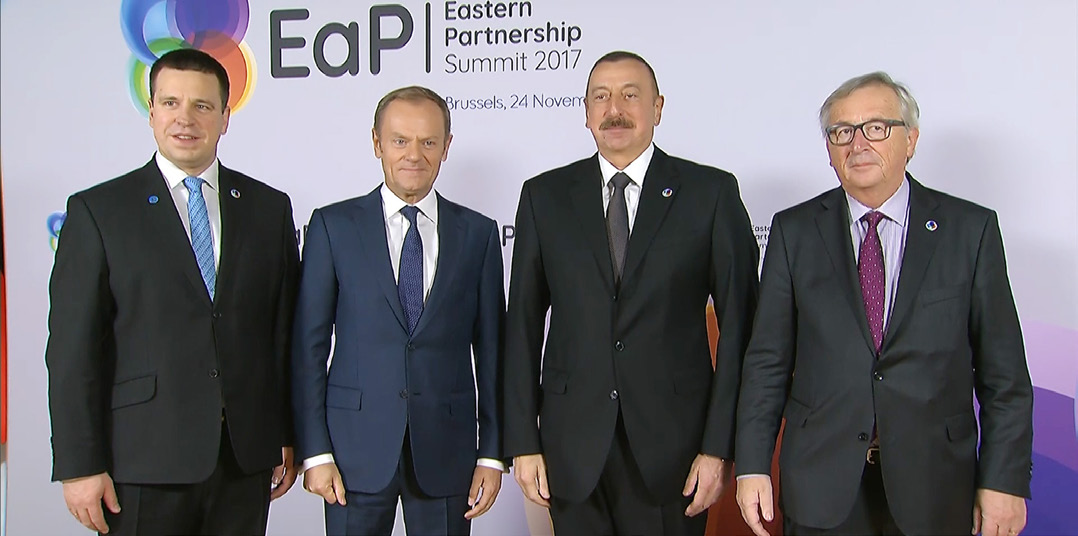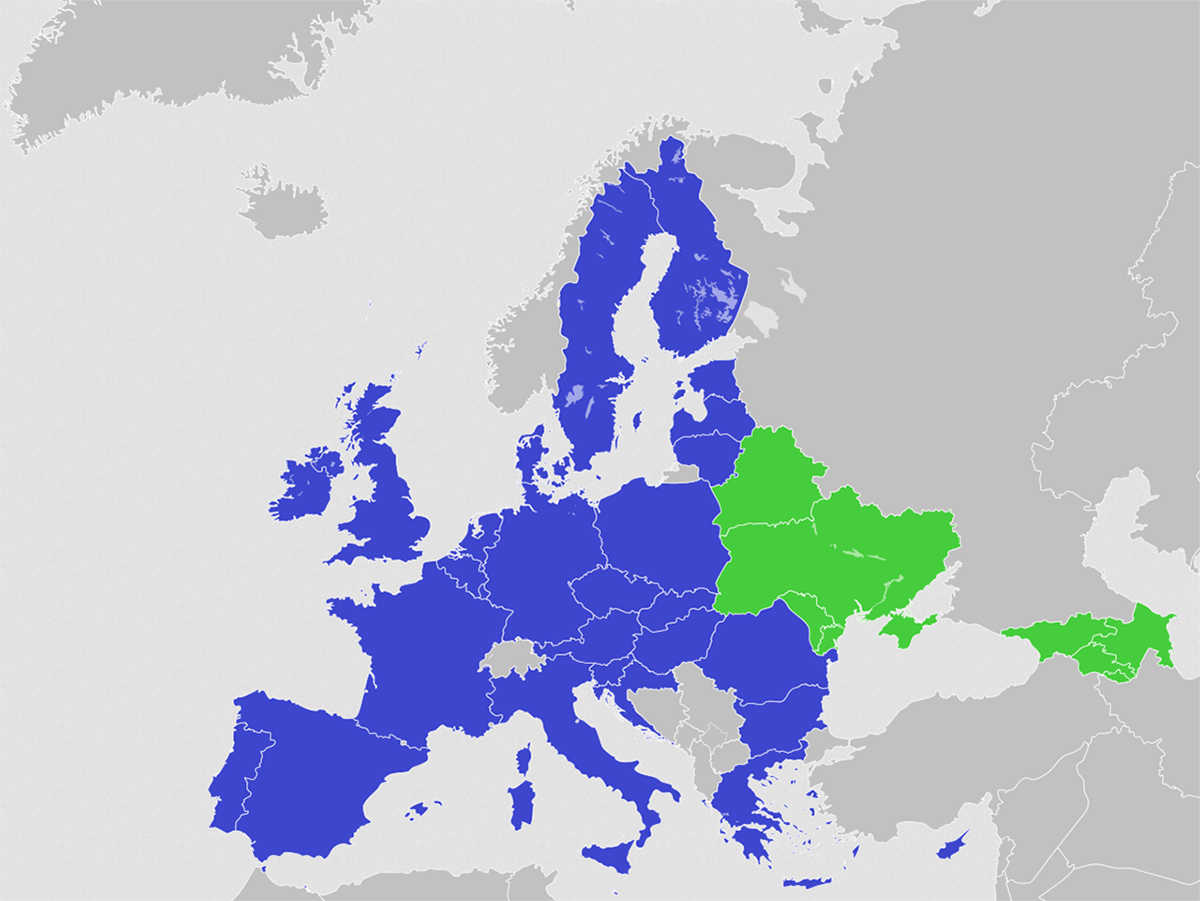In the EU’s Eastern Partnership, Western Dissension Opens Doors for Putin
19 Sep 2018
By Denis Cenusa for Atlantic Council
This article was external pageoriginally publishedcall_made by the external pageAtlantic Councilcall_made in August 2018. external pageImagecall_made courtesy of Concus Cretus/Wikipedia. external pageCC BY-SA 4.0call_made
While the West continues to support efforts to democratize the countries of the Eastern Partnership (EaP), shifting international trends threaten to slow the momentum. Increasing confrontation among Western leaders—evidenced, inter alia, by the outbreak of protectionist trade policies and Donald Trump’s dissociation from G7 positions at the June 2018 summit in Quebec—can have unintended consequences across the EaP region, which needs Western harmony if it is to align with Euro-Atlantic visions of common values and security.
Indeed, because most EaP countries are still in the midst of a liberal transition, they remain particularly vulnerable to Kremlin influence. Any extended fragmentation of the liberal order in the West could decelerate the democratization process, as it becomes harder for the West to serve as a role model for emerging democracies.
Uncertainties about the future of the EaP are exacerbated by disarray within the European Union, fueled by Brexit; the growing political legitimacy of Euroskeptic populists in both newer and older member states; and the lack of a harmonious strategy between the European Union (EU) and the United States. For instance, the EU operates with transformational tools such as the Association Agreements in three of the six EaP countries (Moldova, Ukraine, and Georgia), while the United States has developed advanced systems of strategic dialogue only with Georgia and Ukraine.
The lack of a clear, consistent strategy among Western allies makes it more difficult to overcome oligarchical and/or authoritarian control in the region, which in turn slows (or prevents) democratization. Nonetheless, the region appears to be open to democratic changes, even in countries such as Armenia that greatly depend on Russia—if and when the West is able to coalesce around a common strategy for implementing these changes.

Giving EaP countries a “sense of belonging”
Western countries’ difficulty in protecting their own democratic institutions from populist and radical political forces, and their contradictory postures toward Russia, send confusing signals to the Eastern Partnership states. Domestic and external “spoilers” in the EaP region—oligarchs, the Kremlin—seize on this chaos to push self-interested agendas.
Russia’s tools include punitive trade measures and conventional or hybrid warfare aimed at disrupting and complicating contacts between EaP countries and the West. The 2008 NATO Summit in Bucharest, with its declaration that Ukraine and Georgia “will become members of NATO,” marked the turning point in Russia’s capacity and willingness to reshape the EaP region’s borders, as was confirmed six years later with the annexation of Crimea and infection of the Donbas with militarized separatism.
The most powerful signal the West could send would be to resuscitate the NATO accession talks with Ukraine and Georgia that were abandoned after a toothless promise of membership. Alternatively, the EU could explicitly guarantee a prospect of accession for all eligible EaP countries within a realistic time span.
Russia enjoys the status quo
NATO’s adoption of a lukewarm posture toward Ukraine’s and Georgia’s accession helped Russia avert a deeper alliance and cost those two countries their territorial integrity. This in turn exposed the lack of security for Ukraine and Georgia and legitimized a “strategic patience” toward Russia’s self-imposed presence in the region.
Thus, the Kremlin perpetuates open armed confrontation in the Donbas, complementary to further steps to detach Crimea from Ukraine (such as opening the “Crimean Bridge”). In three other EaP countries, Moldova, Armenia, and Azerbaijan, Russia prefers to preserve, rather than solve, so-called “frozen conflicts.” While it has not managed to fully return Moldova and Georgia to Russia’s permanent sphere of influence, the Kremlin is satisfied with the status quo.
A way to overcome Russia’s monopoly on conflict settlement is to conduct multilevel negotiations between and among all parties, attracting all relevant stakeholders. Moreover, traditional guardians of regional order such as the Organization for Security and Co-operation in Europe should make stronger commitments to implementing the European architecture of security. Combining European integration of the EaP countries with NATO acceptance of Ukraine and Georgia will stimulate internal strength and push back Russian intervention.
Essential changes, however, must happen locally. Resilience should be built not only in politics and defense, but also in social and economic matters. The most sustainable means of support for these countries is to empower domestic agents of change—civil society organizations, mass media, etc.—and to direct such efforts toward regions that might be especially vulnerable to Russian subversion.
Armenia challenges the status quo
The peaceful transfer of power in Armenia, following weeks of widespread, nonviolent demonstrations that saw off longtime leader and incipient autocrat Serzh Sargsyan and led to protest leader Nikol Pashinyan’s installation as prime minister in May, energized the entire region.
Armenia is a vivid example of the unexplored potential of self-transformation, demonstrating that people can successfully emancipate themselves even under authoritarian conditions. By avoiding geopolitical issues, the country’s new political elite blunted Russia’s typical attempt to blame Western involvement (à la Euromaidan). The protest movement, and their role in it, gives them a deep well of public legitimacy.
Still, the new leadership faces new difficulties, not least public expectations of sweeping social change and uncertainty as to whether Pashinyan’s government can deliver promised policies and stave off a revival of the old system. Externally, Armenia’s rocky relationship with Turkey, the absence of an effective deterrent against Azerbaijan’s military expansion, and the unpredictability of Russian factors present additional challenges. Indeed, Armenia continues to depend on Russia for cheap gas ($150 per 1,000 cubic meters), income (Armenians working in Russia accounted for more than 60 percent of an estimated $1.7 billion in remittances last year), military cooperation (cheap loans for procurement of Russian weapons), and security amid flare-ups in the Nagorno-Karabakh conflict.
Certainly, Armenia needs to learn how to finesse and ultimately reduce its reliance on Russia. The newly emancipated political elite will test whether democratic institutions can be successfully built in the shadow of an indispensable strategic partnership with the Kremlin. Without sustainable agents of change (youth, civil society, media, etc.), higher standards of accountability in the political system, and trust in public institutions, democratization in Armenia could stagnate or even regress. Any setbacks will benefit Kremlin-controlled media and the old political system—and may compromise the work of pro-democracy groups across the EaP region.

The need for a united Western front
Western support for reforms in the Eastern Partnership states has a lasting effect on regional stability and contributes to reducing corruption and kleptocracy. The proliferation of systemic reforms in Georgia, Moldova, and Ukraine is driven largely by and conducted through their Association Agreements with the EU. A synergy between the EU and the United States could dramatically increase the positive impact on regional development.

Western values such as rule of law are attractive for EaP citizens, who are prepared to fight for them—either peacefully (e.g., the nonviolent protests in Armenia) or with conventional weapons (Ukrainians in the Donbas). Consequently, reform efforts require Western unity—a unity that, in this area, must be shielded from any fallout from emerging disagreements within the transatlantic alliance. Each Western country bears responsibility for creating a positive image of the West, based on its strong institutions, guaranteed rule of law, and fight against “big corruption.”
The principle of “conditionality,” under which financial assistance such as direct aid hinges on fulfilling reform commitments, also plays a powerful role. A core element of the relationship between the EU and aspiring member states (and of relationships involving international financial institutions), conditionality is also implied by the EaP Association Agreements. It is a key tool to ensure consistency in multilateral demands for economic, political, and judicial reforms, and the Eastern Partnership presents a beneficial platform to maximize its potential.
Dismantling corruption in Ukraine
Since toppling a corrupt government through its “revolution of dignity,” Ukraine has worked hard to combat corruption, starting with state institutions. Although the progress has been slow, it has created synergistic efforts between civil society and external partners to expose and address widespread malfeasance.
Conditionality, in the form of extensive post-2014 financial aid from the International Monetary Fund (IMF) and establishment of a visa-free regime with the EU, has had a powerful “push effect.” However, strong opposition forces remain in the government and have worked to stymie anticorruption measures—for example, boycotting and hampering the newly established National Anti-Corruption Bureau of Ukraine and dragging out parliamentary approval of a new anticorruption court demanded by the IMF.
The threat posed by these “old system” forces shows Ukraine cannot rely on aid-linked conditionality alone to shore up anticorruption efforts; in conjunction with its Western partners, it must also pursue new and innovative solutions. These might include systemic pressure against corrupt decision makers, such as visa bans or freezing personal assets — measures typically associated with geopolitical conflict (e.g., the Crimea annexation) but untried as levers for reform. Another way to discourage corrupt habits within the political system is to follow the dirty money flowing through Western jurisdictions and banking systems; expose its origins; and name, shame, and prosecute those behind the illegal schemes.
The anticorruption fight will have only partial success without a strong ground game, one that includes a civil society able to protect and promote an anticorruption agenda; journalists and other investigators able to identify and track the sources and beneficiaries of corruption; and functional independent institutions such as the National Agency for Prevention of Corruption and the Anticorruption Courts.
Conclusion
Corruption is a major source of the insecurity in the EaP region that permits Russia’s continued campaign to undermine nearby emerging democracies. This corruption discredits governments, disillusions the public, and puts reform agendas in disarray. It enables and empowers kleptocratic elites that are vulnerable, and therefore resistant, to qualitative political change.
Accordingly, the support of the EaP countries’ external partners is vitally important. These partners should invest in helping EaP states build internal resilience via domestic networks of independent state institutions and strong nonstate stakeholders.
Reform, with the core task of dismantling corruption, should be one of the main pillars of the eventual common US-EU strategy for the Eastern Partnership. In pursuing it, the West will contribute to a “virtuous circle” of cooperation, regardless of the fractious dialogue among Western powers on other issues. In this way, the entire EaP region will be reassured against a potential geopolitical abandonment to the “gray zone” where Putin’s regime continues to redefine the rules.
About the Author
Denis Cenusa is an Associated Expert at Think Tank ‘Expert- Grup’, researcher at the Institut für Politikwissenschaft, a PhD student at Justus-Liebig-Universität, and editor at the Moldovan News Agency “IPN.” He is also a member of the Eastern Partnership Civil Society Forum, Working Group 3 on Energy and Environment.
For more information on issues and events that shape our world, please visit the CSS Blog Network or browse our Digital Library.

